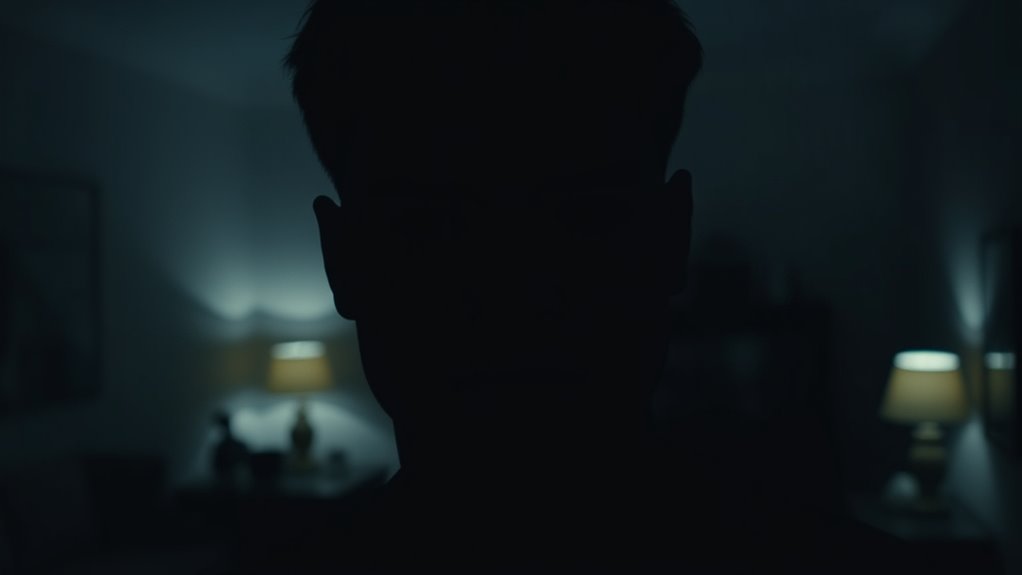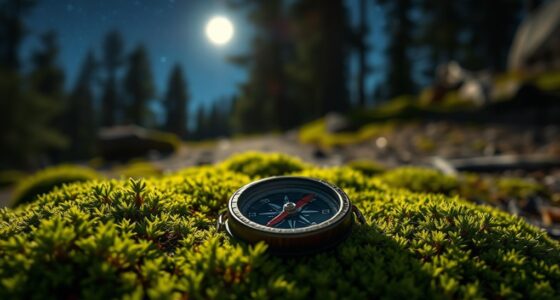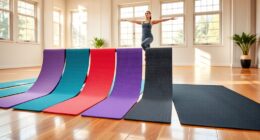To improve your night vision, start practicing in dim environments like dusk or a dark room, focusing on shadowed objects without bright screens. Let your eyes gradually adapt by avoiding sudden bright lights and incorporating regular exercises like scanning surroundings and observing subtle shadows. Over time, this builds peripheral vision and enhances low-light sensitivity, reducing the need for flashlights. Keep practicing consistently, and you’ll discover more effective techniques to navigate confidently in darkness.
Key Takeaways
- Practice in dim environments to gradually enhance your eyes’ adaptation to low light.
- Avoid bright screens and sudden light exposure to calibrate your night vision sensors effectively.
- Focus on shadowed objects and peripheral vision to improve detection of movement and shapes in darkness.
- Use virtual or simulated low-light exercises to train your eyes without relying on flashlights.
- Consistent, patient practice over time strengthens your natural night vision and navigation skills.

Have you ever wished you could see clearly in the dark without expensive equipment? The truth is, your eyes are capable of remarkable adaptation, but you need to train them to maximize their potential. One key aspect is understanding how your eyes undergo eye adaptation, a natural process that enhances your night vision over time. When you step from a brightly lit area into darkness, your eyes need a moment to adjust, as your pupils dilate to let in more light. The more you practice this shift, the faster your eyes learn to adapt, improving your ability to steer in low-light conditions without relying on flashlights or night-vision gear.
Training your eyes to adapt quickly enhances night vision without equipment.
In addition to eye adaptation, sensor calibration plays a subtle yet essential role. Your eyes are essentially biological sensors, constantly collecting and processing light signals. By consciously training yourself to focus on low-light cues and avoid overexposing your eyes to sudden bright lights, you help calibrate your visual sensors. This means resisting the urge to look directly at bright objects or screens before entering dark environments, which resets your eyes and temporarily hampers night vision. Instead, try to gradually reduce your exposure to light beforehand, allowing your eyes to adjust naturally and maintain their sensitivity.
Practicing specific exercises can accelerate this process. For example, sit in a dim room or outside at dusk and focus on objects in the shadows. Avoid using your phone or any bright screens, which can interfere with your eye adaptation. Instead, let your eyes slowly adjust, paying attention to how subtle changes in light reveal more detail over time. As you do this regularly, you’ll notice your ability to discern shapes and movement in darkness improves because your eyes become more efficient at processing low levels of light. It’s also helpful to train your peripheral vision, which is more sensitive in low-light conditions, by scanning your surroundings rather than fixating on one spot.
Additionally, recent advancements in AI technology in education are helping develop innovative training tools that simulate low-light environments for practice, making it easier to enhance night vision skills through virtual exercises. Over time, you’ll develop a heightened sense of how your eyes respond to different lighting conditions, effectively calibrating your visual sensors for night navigation. Your pupils will adapt faster, and your brain will learn to interpret minimal cues more effectively. Remember, consistency is key—regular exposure to dark environments and conscious focus on eye adaptation will train your eyes to see better in the dark. With patience and practice, you can markedly improve your night vision, reducing your dependence on artificial lighting and becoming more confident steering in low-light situations.
Frequently Asked Questions
Can Night Vision Training Improve My Eyesight Permanently?
Night vision training can help improve your eyesight temporarily through retinal adaptation, making your eyes more efficient in low light. However, it doesn’t lead to permanent enhancements in your visual acuity. You might notice better night awareness initially, but lasting improvements usually require medical interventions. Focus on maintaining good eye health, and consult an eye specialist for any significant vision concerns. Night vision exercises won’t permanently change your eyesight.
What Are the Best Exercises for Enhancing Night Vision?
Like a cat adjusting to darkness, you can enhance your night vision through specific exercises. Focus on eye adaptation by practicing in low light conditions, gradually increasing exposure to help your eyes adjust. Improve light sensitivity by blinking rapidly or shifting focus between near and far objects. These exercises strengthen your eyes’ ability to adapt, making it easier to see in dim environments without strain or reliance on a flashlight.
How Long Does It Take to Develop Night Vision Skills?
Developing night vision skills varies, but with consistent darkness exposure, you can notice improvements in a few weeks. Your eyes undergo visual adaptation as they adjust to low light, enhancing your ability to see in darkness. Regular practice and patience are key; the more you expose yourself to darkness, the better your eyes will adapt over time. Typically, noticeable progress appears within 2 to 4 weeks of dedicated darkness exposure.
Are There Any Risks Involved in Night-Vision Training?
You might wonder if night-vision training has risks. While it can improve your ability to see in low light, it may cause eye strain and vision fatigue if you push your eyes too hard or for too long. To avoid these issues, take regular breaks and listen to your body’s signals. Proper training gradually builds skills without risking discomfort or harm to your eyes.
Can Supplements Help Improve Night Vision Naturally?
Supplements can support natural night vision, but their efficacy varies. You might consider options like vitamin A, which is vital for visual enhancement, or carotenoids like lutein and zeaxanthin. While some supplements may help improve your eye health, remember that their effectiveness isn’t guaranteed and isn’t a substitute for proper training. Always consult a healthcare professional before adding new supplements to confirm they’re safe and suitable for you.
Conclusion
By practicing these night-vision hacks, you’re sharpening your senses like a seasoned explorer, turning darkness into an ally rather than a foe. With patience and consistency, your eyes will adapt, revealing hidden details and guiding you through the shadows. Think of your vision as a lantern that grows brighter with each step, illuminating your path even when the world around you is cloaked in darkness. Embrace the night, and let your skills become your guiding star.











